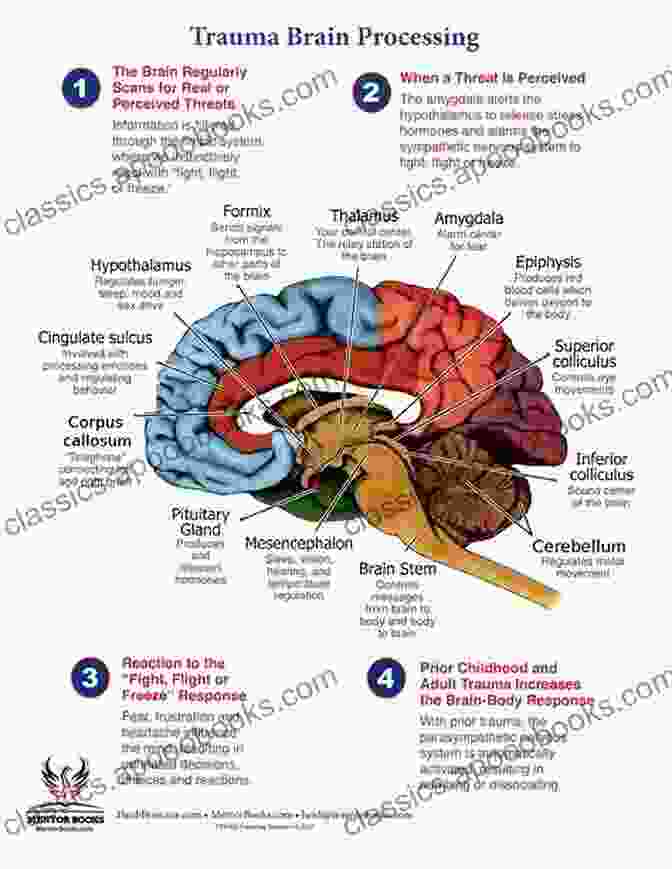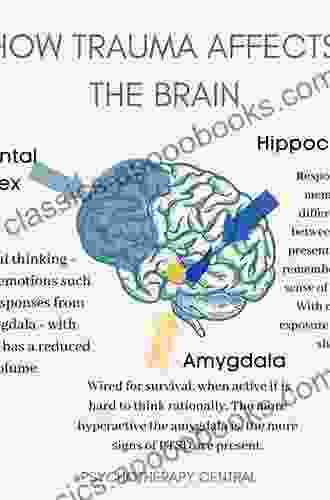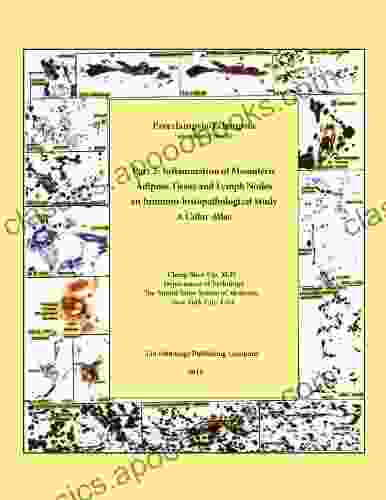Unveiling the Impact of Psychological Trauma on the Developing Brain


Psychological trauma, an overwhelming and distressing event that threatens an individual's well-being, can have profound and lasting effects on the developing brain. Understanding the mechanisms and consequences of trauma on the brain is crucial for healthcare professionals, educators, caregivers, and anyone seeking to support individuals who have experienced trauma.
The Neurobiology of Trauma
When faced with a traumatic event, the brain enters a state of heightened arousal, releasing stress hormones like cortisol and adrenaline. This response, known as the fight-flight-freeze response, prepares the body to respond to immediate danger. However, in the case of chronic or repeated trauma, this state of arousal can become dysregulated, leading to structural and functional changes in the brain.
4.8 out of 5
| Language | : | English |
| File size | : | 1946 KB |
| Text-to-Speech | : | Enabled |
| Screen Reader | : | Supported |
| Enhanced typesetting | : | Enabled |
| Word Wise | : | Enabled |
| Print length | : | 284 pages |
- Hippocampus: Trauma can disrupt the development and functioning of the hippocampus, a brain region responsible for memory and learning. This can lead to impairments in memory consolidation, difficulty recalling events, and decreased ability to form new memories.
- Amygdala: The amygdala, involved in fear and emotional processing, becomes hyperactive in response to trauma. It can trigger heightened fear responses, emotional reactivity, and difficulty regulating emotions.
- Prefrontal Cortex: The prefrontal cortex, responsible for executive functions like planning, decision-making, and emotional control, can be impaired by trauma. This can lead to difficulties with attention, concentration, and impulse control.
Consequences of Trauma on Brain Development
The impact of trauma on the developing brain can manifest in a range of cognitive, emotional, and behavioral difficulties:
- Cognitive Impairments: Trauma can affect attention, memory, and executive function, leading to learning difficulties, academic struggles, and impaired problem-solving abilities.
- Emotional Dysregulation: Trauma survivors may experience difficulty regulating their emotions, exhibiting extremes of anger, sadness, or fear. They may also have difficulty controlling impulsive behaviors.
- Behavioral Problems: Trauma can increase the likelihood of engaging in risky or self-destructive behaviors, such as substance abuse, self-harm, and antisocial behaviors.
- Mental Health Conditions: Trauma is a significant risk factor for developing mental health disFree Downloads, including post-traumatic stress disFree Download (PTSD),depression, and anxiety.
Interventions for Healing
Supporting individuals who have experienced psychological trauma requires a multifaceted approach that addresses both the psychological and neurobiological effects of trauma. Effective interventions include:
- Trauma-Informed Therapy: Therapies like cognitive behavioral therapy (CBT),trauma-focused cognitive behavioral therapy (TF-CBT),and eye movement desensitization and reprocessing (EMDR) can help individuals process and cope with traumatic experiences.
- Medication: In some cases, medication may be necessary to manage symptoms such as anxiety, depression, or sleep disturbances.
- Lifestyle Interventions: Engagement in healthy lifestyle practices, such as regular exercise, balanced nutrition, and sufficient sleep, can support brain health and resilience.
- Social Support: Building a supportive network of family, friends, and peers can provide a safe and encouraging environment for healing.
Understanding the impact of psychological trauma on the developing brain is essential for providing compassionate and effective support to individuals who have experienced trauma. By recognizing the neurobiological mechanisms involved, we can better appreciate the challenges faced by trauma survivors and tailor interventions to their specific needs.
Trauma-informed care, evidence-based therapies, and a supportive environment can empower individuals to heal from the effects of trauma, build resilience, and live fulfilling lives.
4.8 out of 5
| Language | : | English |
| File size | : | 1946 KB |
| Text-to-Speech | : | Enabled |
| Screen Reader | : | Supported |
| Enhanced typesetting | : | Enabled |
| Word Wise | : | Enabled |
| Print length | : | 284 pages |
Do you want to contribute by writing guest posts on this blog?
Please contact us and send us a resume of previous articles that you have written.
 Book
Book Novel
Novel Page
Page Chapter
Chapter Text
Text Story
Story Genre
Genre Reader
Reader Library
Library Paperback
Paperback E-book
E-book Magazine
Magazine Newspaper
Newspaper Paragraph
Paragraph Sentence
Sentence Bookmark
Bookmark Shelf
Shelf Glossary
Glossary Bibliography
Bibliography Foreword
Foreword Preface
Preface Synopsis
Synopsis Annotation
Annotation Footnote
Footnote Manuscript
Manuscript Scroll
Scroll Codex
Codex Tome
Tome Bestseller
Bestseller Classics
Classics Library card
Library card Narrative
Narrative Biography
Biography Autobiography
Autobiography Memoir
Memoir Reference
Reference Encyclopedia
Encyclopedia Elinor Dewire
Elinor Dewire David Nathan
David Nathan Marlene Orozco
Marlene Orozco Jacqueline Leonard
Jacqueline Leonard Christine Jay
Christine Jay Andy Herbach
Andy Herbach Brian Shea
Brian Shea Sharon Kim
Sharon Kim Andrew Gumbel
Andrew Gumbel Roger Mac Ginty
Roger Mac Ginty Angela D Levy
Angela D Levy N K Wardley
N K Wardley Debbie Tomkies
Debbie Tomkies Claudia Gray
Claudia Gray Andrew Wallis
Andrew Wallis John Kelso
John Kelso Curtis W Ellison
Curtis W Ellison Mary Oldham
Mary Oldham Mary Morris
Mary Morris Andrew Darby
Andrew Darby
Light bulbAdvertise smarter! Our strategic ad space ensures maximum exposure. Reserve your spot today!
 Derek CookFollow ·3k
Derek CookFollow ·3k Colby CoxFollow ·9.3k
Colby CoxFollow ·9.3k Colin RichardsonFollow ·3.5k
Colin RichardsonFollow ·3.5k Ralph TurnerFollow ·11k
Ralph TurnerFollow ·11k Enrique BlairFollow ·15.9k
Enrique BlairFollow ·15.9k Gage HayesFollow ·3.8k
Gage HayesFollow ·3.8k Cason CoxFollow ·6.6k
Cason CoxFollow ·6.6k Vic ParkerFollow ·12.1k
Vic ParkerFollow ·12.1k

 Devin Ross
Devin RossUnlocking the Secrets of the Mind: Brain Mapping...
The human...

 Jacob Foster
Jacob FosterNovel of Misconception, Truth, and Love: A Journey of...
Unraveling the Lies We...

 Benji Powell
Benji PowellThe Only Technique You Will Ever Need: Unlocking the...
By [Author's...

 Pete Blair
Pete BlairUnveiling the Enchanting World of 'Magnolia House' by...
A Literary...
4.8 out of 5
| Language | : | English |
| File size | : | 1946 KB |
| Text-to-Speech | : | Enabled |
| Screen Reader | : | Supported |
| Enhanced typesetting | : | Enabled |
| Word Wise | : | Enabled |
| Print length | : | 284 pages |
















